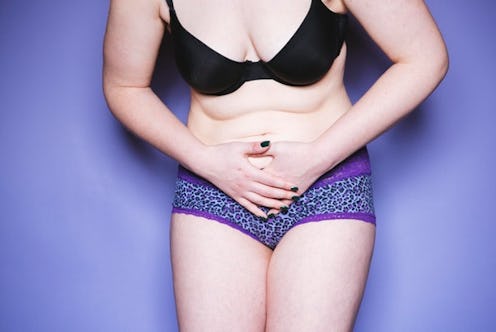
If you don’t suffer from any period problems, you’re in the minority. 84.1 percent of people with periods experience pain, 47.8 percent get PMS, and 14.3 percent have irregular periods. However, just because these issues are common doesn’t make them "normal", and it definitely doesn’t make them inevitable. In fact, sometimes all it takes to prevent them is learning how different foods affect you.
One general rule of thumb if you want to make your period easier and healthier is to eat a colorful array of foods, Kathryn Simmons Flynn, founder of FertileFoods.com and Moontime Fertility Tea, tells Bustle. “Fill your plate with colorful, organic fruits and vegetables to ensure you are getting the array of vitamins, minerals, antioxidants, and phytonutrients your body needs to cleanse naturally from environmental toxins and excess medications,” she says. “Reduce stress of a physiological level by timing your meals: balance your blood sugar by eating regular meals and snacks and always a carbohydrate protein balance which helps to reduce the fluctuations of stress hormones like cortisol.”
To get more specific, here are some nutrients experts recommend to make sure you’re getting if you want to curb period problems or just enjoy an overall healthier period and life.
1Calcium
Calcium has been proven to curb PMS symptoms, Rebecca Lee, a Registered Nurse from New York City and founder of RemediesForMe.com, tells Bustle. One study found that the more calcium women consumed, the less likely they were to develop PMS. Another found that women who got 1,200 mg of calcium per day as a supplement had fewer PMS symptoms than those who got a placebo. You can get calcium from dairy products, spinach, kale, soy, or supplements.
2Vitamin D
In order to absorb calcium, you need Vitamin D, says Lee. So, it’s not surprising that Vitamin D is also linked to lower rates of PMS. For one University of Massachusetts study, women were surveyed about their Vitamin D intake and PMS symptoms. Those who consumed more Vitamin D-rich foods were less likely to suffer from PMS. These foods include fatty fish, cheese, and eggs. You can also get Vitamin D through supplements.
3St John's Wort
If you get depressed before or around your period, this supplement is a must-try. One study even found that it was more effective than Prozac in treating major depression. “What is more surprising is that the herb also seems to improve physical symptoms such as bloating, breast tenderness, and cravings,” says Lee. “St John’s wort is known to lower estrogen levels. … It may improve physical symptoms of PMS by helping to maintain the estrogen-progesterone balance throughout the menstrual cycle.”
4Magnesium
“Only about a third of Americans meet the recommended daily intake for magnesium, an essential mineral present in every cell of the body,” says Lee. “Research has shown that women with PMS tend to have significantly lower levels of magnesium in their blood than women who don’t suffer from the condition. A number of studies have found that magnesium supplements can relieve a variety of PMS symptoms.” Other research has linked magnesium with lower rates of bloating and breast tenderness. You can find magnesium in spinach, dark chocolate, almonds, avocado, yogurt, and banana.
5Chasteberry
This fruit from the chaste tree is often used to treat PMS, says Lee, likely because it increases levels of the hormone progesterone. One trial found that women with PMS who took a 20-mg chasteberry fruit extract tablet daily for three menstrual cycles experienced less crankiness, headaches, and breast fullness than those who took a placebo. You can get Chasteberry supplements or Bootsy Chushu's Hormone Balancing Elixir, a formula made of chasteberry that you drop into your water.
6B Vitamins
Vitamins B2 and B6 are involved in the creation of the neurotransmitter serotonin, which is considered an endorphin, Lee explains. For its part, B1 is involved in production of GABA, which can help calm anxiety. Taken together, B vitamins can help alleviate the emotional symptoms of PMS. So, it’s not surprising that research has associated all three with lower PMS risk. You can get Vitamin B2 from milk, yogurt, mushrooms, and spinach, Vitamin B6 from chickpeas, fish, and chicken, and Vitamin B1 from beef, nuts, oats, and oranges.
7Di-indolymethane
Period pain comes from an imbalance of chemicals called prostaglandins that control your uterine contractions, and an excess of estrogen can make you produce too many pain-inducing prostaglandins. That’s where di-indolymethane (DiM) comes in: It helps you metabolize estrogen so you have less hanging around, says Simmons Flynn. You can get it from cruciferous vegetables like broccoli, cauliflower, and cabbage.
If you want to know what foods might benefit you most during your period, you can use a period tracker to keep track of what symptoms you experience and what foods make you feel better or worse, then eat accordingly.